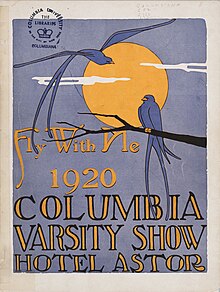
Carousel is the second musical by the team of Richard Rodgers (music) and Oscar Hammerstein II. The 1945 work was adapted from Ferenc Molnár's 1909 play Liliom, transplanting its Budapest setting to the Maine coastline. The story revolves around carousel barker Billy Bigelow, whose romance with millworker Julie Jordan comes at the price of both their jobs. He participates in a robbery to provide for Julie and their unborn child; after it goes tragically wrong, he is given a chance to make things right. A secondary plot line deals with millworker Carrie Pipperidge and her romance with ambitious fisherman Enoch Snow. The show includes the well-known songs "If I Loved You", "June Is Bustin' Out All Over" and "You'll Never Walk Alone". Richard Rodgers later wrote that Carousel was his favorite of all his musicals.
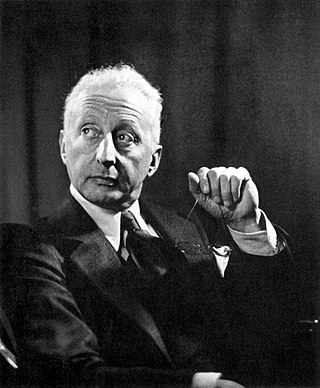
Jerome David Kern was an American composer of musical theatre and popular music. One of the most important American theatre composers of the early 20th century, he wrote more than 700 songs, used in over 100 stage works, including such classics as "Ol' Man River", "Can't Help Lovin' Dat Man", "A Fine Romance", "Smoke Gets in Your Eyes", "The Song Is You", "All the Things You Are", "The Way You Look Tonight" and "Long Ago ". He collaborated with many of the leading librettists and lyricists of his era, including George Grossmith Jr., Guy Bolton, P. G. Wodehouse, Otto Harbach, Oscar Hammerstein II, Dorothy Fields, Johnny Mercer, Ira Gershwin and Yip Harburg.

Oscar Greeley Clendenning Hammerstein II was an American lyricist, librettist, theatrical producer, and director in musical theater for nearly 40 years. He won eight Tony Awards and two Academy Awards for Best Original Song. Many of his songs are standard repertoire for vocalists and jazz musicians. He co-wrote 850 songs.

Richard Charles Rodgers was an American composer who worked primarily in musical theater. With 43 Broadway musicals and over 900 songs to his credit, Rodgers was one of the most well-known American composers of the 20th century, and his compositions had a significant influence on popular music.

Otto Abels Harbach, born Otto Abels Hauerbach was an American lyricist and librettist of nearly 50 musical comedies and operettas. Harbach collaborated as lyricist or librettist with many of the leading Broadway composers of the early 20th century, including Jerome Kern, Louis Hirsch, Herbert Stothart, Vincent Youmans, George Gershwin, and Sigmund Romberg. Harbach believed that music, lyrics, and story should be closely connected, and, as Oscar Hammerstein II's mentor, he encouraged Hammerstein to write musicals in this manner. Harbach is considered one of the first great Broadway lyricists, and he helped raise the status of the lyricist in an age more concerned with music, spectacle, and stars. Some of his more famous lyrics are "Smoke Gets in Your Eyes", "Indian Love Call" and "Cuddle up a Little Closer, Lovey Mine".

Lorenz Milton Hart was an American lyricist and half of the Broadway songwriting team Rodgers and Hart. Some of his more famous lyrics include "Blue Moon"; "The Lady Is a Tramp"; "Manhattan"; "Bewitched, Bothered and Bewildered"; and "My Funny Valentine".
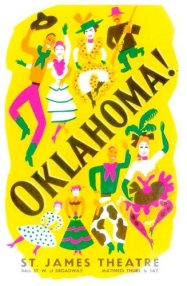
Oklahoma! is the first musical written by the duo of Rodgers and Hammerstein. The musical is based on Lynn Riggs' 1931 play, Green Grow the Lilacs. Set in farm country outside the town of Claremore, Indian Territory, in 1906, it tells the story of farm girl Laurey Williams and her courtship by two rival suitors, cowboy Curly McLain and the sinister and frightening farmhand Jud Fry. A secondary romance concerns cowboy Will Parker and his flirtatious fiancée, Ado Annie.

Rodgers and Hart were an American songwriting partnership between composer Richard Rodgers (1902–1979) and the lyricist Lorenz Hart (1895–1943). They worked together on 28 stage musicals and more than 500 songs from 1919 until Hart's death in 1943.

Rodgers and Hammerstein was a theater-writing team of composer Richard Rodgers (1902–1979) and lyricist-dramatist Oscar Hammerstein II (1895–1960), who together created a series of innovative and influential American musicals. Their musical theater writing partnership has been called the greatest of the 20th century.

Garrick Gaieties is a revue with music by Richard Rodgers and lyrics by Lorenz Hart, the first successful musical by this songwriting team.

Lew Fields was an American actor, comedian, vaudeville star, theatre manager, and producer. He was part of a comedy duo with Joe Weber. He also produced shows on his own and starred in comedy films.
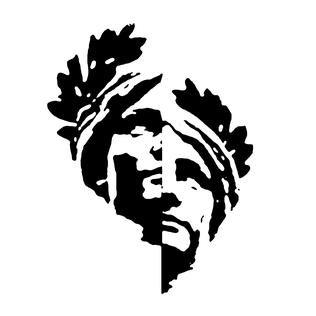
The Varsity Show is one of the oldest traditions at Columbia University. Founded in 1893 as a fundraiser for the university's fledgling athletic teams, the Varsity Show now draws together the entire Columbia undergraduate community for a series of performances every April. Dedicated to producing a unique full-length musical that skewers and satirizes many dubious aspects of life at Columbia, the Varsity Show is written and performed exclusively by university undergraduates. Various renowned playwrights, composers, authors, directors, and actors have contributed to the Varsity Show, either as writers or performers, while students at Columbia, including Richard Rodgers, Oscar Hammerstein II, Lorenz Hart, Herman J. Mankiewicz, I. A. L. Diamond, Herman Wouk, Greta Gerwig, and Kate McKinnon.

Pal Joey is a 1940 musical with a book by John O'Hara and music and lyrics by Richard Rodgers and Lorenz Hart. The musical is based on a character and situations O'Hara created in a series of short stories published in The New Yorker, which he later published in novel form. The title character, Joey Evans, is a manipulative small-time nightclub performer whose ambitions lead him into an affair with the wealthy, middle-aged and married Vera Simpson. It includes two songs that have become standards: "I Could Write a Book" and "Bewitched, Bothered and Bewildered".

Herbert Fields was an American librettist and screenwriter.
"You Took Advantage of Me" is a 1928 popular song composed by Richard Rodgers, with lyrics by Lorenz Hart, for the musical Present Arms (1928), where it was introduced by Joyce Barbour and Busby Berkeley as the characters Edna Stevens and Douglas Atwell. The characters were formerly married, but still have romantic feelings for each other. On opening night, Berkeley forgot the lyrics and had to scat and hum the entire second verse. Berkeley also claimed that his nonsense lyrics for the improvised second verse left Hart "almost apoplectic", but the audience was amused and Hart later forgave him. The song was subsequently included in the 1930 film Leathernecking, an adaptation of Present Arms.
"Spring is Here" is a 1938 popular song composed by Richard Rodgers, with lyrics by Lorenz Hart for the musical I Married an Angel (1938), where it was introduced by Dennis King and Vivienne Segal.
"There's a Small Hotel" is a 1936 song composed by Richard Rodgers, with lyrics by Lorenz Hart. Originally written for but dropped from the musical Billy Rose's Jumbo (1935), it was used in On Your Toes (1936), where it was introduced by Ray Bolger and Doris Carson, and repeated by Jack Whiting and Vera Zorina in the London West End production that opened on 5 February 1937, at the Palace Theatre.
"You're Nearer" is an American popular song by composer Richard Rodgers and lyricist Lorenz Hart from the 1940 film version of the Broadway musical Too Many Girls. It was not in the original Broadway show but was written especially for the movie and copyrighted on August 29, 1940. In the film, it was sung by Lucille Ball and also by Frances Langford with Ann Miller, Libby Bennett and Lucille Ball.

Broadway's Best was an album by Jo Stafford, released in 1953 by Columbia Records. Stafford sings songs from famous Broadway shows backed by Paul Weston and his Orchestra. This album by Columbia was never re-released on compact disc. An MP3 album was issued in 2008.
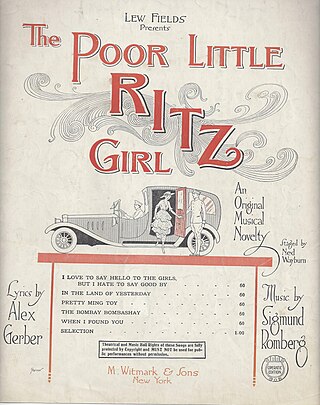
Poor Little Ritz Girl is a musical comedy in two acts, with book by George Campbell and Lew Fields. The show had some songs with lyrics by Alex Gerber and music by Sigmund Romberg and other songs with lyrics by Lorenz Hart and music by Richard Rodgers. The show was produced by Lew Fields at the Central Theatre. It opened on July 28, 1920.
